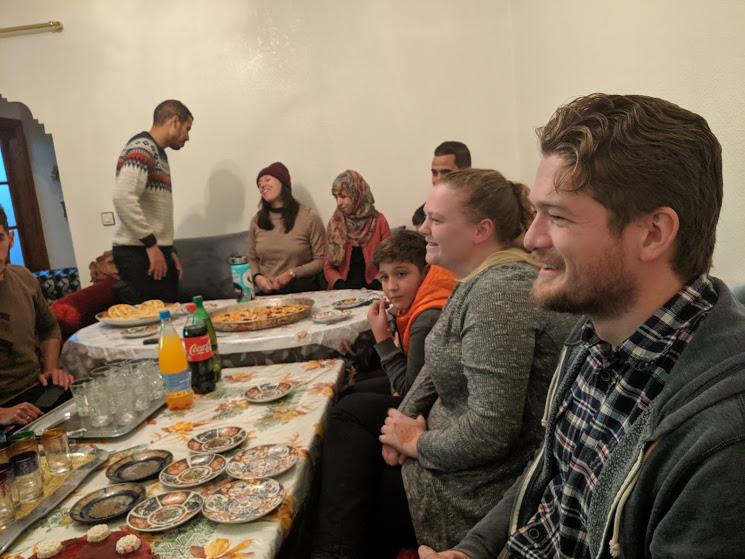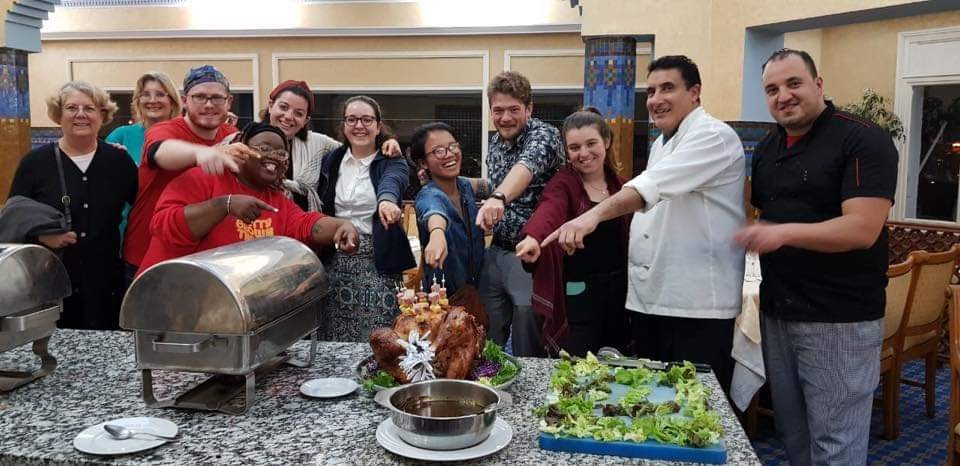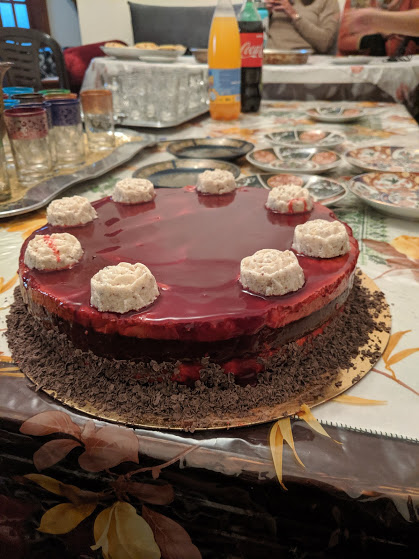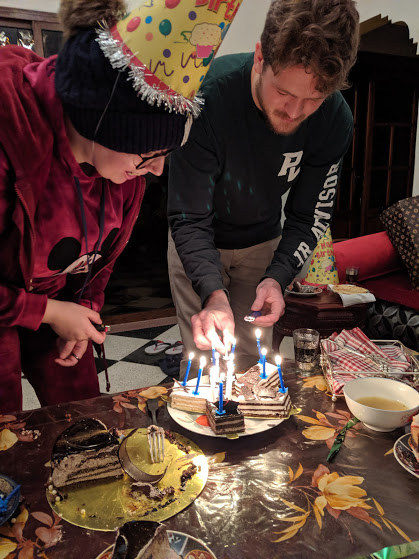Goodbye CBT - Hello final site!
- jasafox
- Nov 25, 2019
- 9 min read
Updated: Feb 3, 2020
This is our final week of Community Based Training (CBT) - where all 110 of our staj-mates got spread out in small training groups around Morocco and worked on language-learning, teaching life skills and English and growing their understanding of cultural norms, holidays and traditions. As I’ve said before, my CBT group was located in a small city about 45 minutes outside of Meknes. The past two months, the five members of my CBT group have worked with our local Nedi Neswi (Women’s Center) as well as our Khedimet Chebab (Youth Services Center). Our lovely Moroccan LCF (language and culture facilitator) Soukaina (from here on out, I’ll refer to her by her nickname Suki), has been with us the whole two months, to teach us Darija, translate many things for us, and just be our overall guide and mentor. Now that our training period is coming to an end and all 110 members of Staj 101 are about to move to new cities and embark on their own projects, I wanted to write about the five projects we did while in CBT, to give everyone back home a better idea of what our Peace Corps training has looked like.
Six days a week, we spent the first half of our day in Suki’s house in a 4 hour long language session. Over the past two months, we’ve spent over 150 hours in formal Darija lessons. Yet somehow, I’m still not fluent. Oh well. At noon, all volunteers would return home for lunch, where we’d eat with our host families. At two, we would return to Suki’s house and spend an hour or two working on our Arabic script, having a culture session, and then traveling to an entity where we’d teach an English or life skills lesson. We were assigned different practicums by the Peace Corps, and had to complete six total practicums over the 10 week training period. The point of each practicum was to give volunteers a taste of the different types of work they might be doing once they’re in their own communities.
The first practicum assignment we completed was called PACA - Participatory Analysis for Community Action. PACA is designed to help volunteers assess the needs and wants of community members, to make sure teaching and programs volunteers design align with the community’s desires. PACA is broken into three parts: Community Mapping, Daily and Seasonal Calendar, and a Needs Assessment. The Community Mapping is an activity where we had women in our Nedi Neswi draw the city and label the places they visit frequently, seldom and never. They also labeled areas they viewed as safe vs. dangerous. The idea of community mapping is for volunteers to see places where they can hold classes and activities where women and community members feel safe and welcome. The Daily and Seasonal Calendar was also filled out my women in the Nedi Neswi - they labeled national and religious holidays throughout the year, and times when they travel or stop attending the Nedi. The calendar activity is meant to give volunteers an idea of when fewer community members are active, so they can plan activities around holidays and school vacations. The final portion of PACA - the Needs Assessment - is in my opinion, the most important. We did our Needs Assessment with members of the Khedimet Chebab, by having the attendees break into smaller groups and brainstorm what they wish was present in their city. After everyone had brainstormed, we formed a list of ideas on the board, and did a pairwise matrix, where everyone got to say what was most important. For example, two things our community said they wanted were more green spaces and a university. When we compared the two, three quarters of the group said they though having a university in the community was more important than having more green spaces. Many of the things that community members in our city mentioned were outside of our capacity as volunteers: they wanted a university, new infrastructure, more job opportunities and industry. However, this did give us the idea that good life skills to focus on might surround job hunting and resume creation.
The second practicum assignment we completed was creating and implementing a splash activity. A splash activity is any fun activity that you hold in your community to increase your visibility and get people interested in working with you and coming to your classes, clubs and events. We designed two splash activities - one for each entity we were working with - but only hosted one. The splash activity we decided on was a recipe exchange and cooking day with the women from the Nedi Neswi. We watched them bake helwa (Moroccan cookies) and after, we taught them to make apple crisp. Cooking together was really fun, but the best part of the splash activity was sitting in the Nedi Neswi’s kitchen, all eating cookies and apple crisp, chatting in broken Dar-English (Darija-English) and enjoying each other’s company.
Our third practicum assignment was teaching English. Because our CBT group worked with two separate entities (most just worked with one) we designed and taught two seperate English classes. The lesson we taught at the Nedi Nedi was a beginner level lesson, where we taught about body parts and colors. We went through formal presentation, gave the women and chance to practice the vocabulary, then played a fun game where we would shout out a color and body part, and they had to put that body part on something of that color. It got to be really hilarious - at one point, all the women had their noses on one of my CBT-mate’s dress. The English lesson we taught at the Khediment Chebab was targeting an audience of advanced English speakers, so the topic we taught about was Environmentalism. We talked about different issues facing the environment today globally, then narrowed down the conversation to talk about environmental issues faced by local areas. Many of the participants noted that the city has problems with waste management, lack of green spaces and pollution. In the following sessions, we brainstormed ways to tackle these problems.


The next practicum assignment we did was on teaching life skills. We interviewed youth aged 10-29 to find out what types of life skills they were interested in practicing, then designed our lessons to target those life skills. At the Khediment Chebab, we worked with youth aged 4 -12. This group of kids identified that they were interested in team building and communication skills. We decided to do Team Pictionary with them, and also teach them some English vocab along the way. We grouped the ~20 kids into 6 groups with 3-4 kids per group, then called each group up to the whiteboard. Each team was given a word in Darija to draw, and each child got to draw for 15 seconds before switching to another child. The team had to work together to draw the item, while the other groups guessed. After the word was guessed, we introduced the term in English and let every child practice saying it. It was really fun and all the kids seemed to love it. When we returned to the Khediment Chebab a week later, the whiteboard had new drawings and vocabulary on it, showing that the kids had been playing it without us there. At the Nedi Neswi, we taught life skills lessons focused on cooperation, team building and active listening. We played one game called the Human Knot, were we had all the women join hands and tangled them together, leaving them to untangle themselves without breaking hands. We also played a game called the Juggler, where women introduced themselves and something they enjoyed doing. After everyone had introduced themselves, the women had to go around the circle and introduce someone else, as well as recall what they enjoyed. It was a nice way to practice active listening (especially for me, since the whole activity was in Darija!) and for the women to get to know us and each other better.

Another activity we were assigned was to target teaching English and life skills in an integrated lesson. This practicum assignment was the hardest (in my opinion) because it was difficult to integrate the two together - something I had never done before. At the Nedi Neswi, we taught a lesson on English greetings, with the life skills aspect focused around communication and public speaking. After the formal teaching of different greeting sequences, each woman stood in front of the class (in pairs) and demonstrated different English greeting sequences together. It was a low-stakes way for them to practice communicating in English and speaking publicly in front of their classmates. At the Khediment Chebab, we taught an English lesson on civic engagement. Civic engagement itself is a life skill, and we focused on the English portion of the lesson on specific traits a person needs to be civically engaged, and how one can develop those characteristics within themselves. The members of the English club came up with tons of great traits, and each talked about a trait they themselves had, and how they could use that trait to start a project within their community.

The last day we went to our entities was last week, and it was really sad to say goodbye. Community based training has been helpful because it’s been great to get a taste of what Peace Corps service looks like in Morocco, but it’s going to be difficult to say goodbye to all the great relationships we established in our city. It’s also going to be really sad to leave my CBT-mates and our teacher, Suki. The six of us created a really close bond these past two months, and have spent endless hours drinking coffee in the local qhwa’s (cafes), playing an intense card game called Coup, laughing, singing in Darija and leaning on each other as a support system. I’m going to miss all of them a ton as we spread out across the country.
The five of us in my CBT group decided to host a Thanksgiving dinner for all of our host families as a thank you, as well as to introduce an American holiday to them. We cooked stuffing, mashed potatoes, gravy, a turkey (really it was a chicken, but let’s all pretend), eggnog, apple crumble, brownies, mac n’ cheese, green beans and veggies for them. I think they honestly thought our American food was pretty strange, but it was still a heart-warming experience. We all went in a circle and said what we were thankful for in Darija, and there were a lot of tears. My CBT mates and my aelah maghribiya (Moroccan family) have been my rocks during these past two months, and I’m gonna miss them a ton.



Other exciting last moments of CBT included celebrating Aaron's birthday - we came home from class to find our host mom had recruited a professional chef and had him making a delicious cake and seafood gourmet pizza (better than it sounds, I swear!) We also threw Suki her first ever birthday party, complete with (more) cake, decorations and presents. Our CBT group had a slumber party at our host family's house, and binge watched Harry Potter. Yesterday Aaron and I and 8 other volunteers helped cooked Thanksgiving dinner for the 110 people in our staj, plus 30 or so staff. Very momentous and only a little bit of pressure HA. Overall, our final week was full of sweetness, laughter, good food and the best company. It was really hard to say goodbye to our host family, and I don't look forward to parting ways with our teacher and CBT group.
A week ago, we had our Language Proficiency Interview to gauge how well our Darija progressed! I was incredibly nervous, but it went well for both Aaron and I. We both went from no Arabic language ability to being able to speak Darija at an intermediate mid level. That was better than I was expecting to do, so I was proud of our progress. That was the last major hurdle we had during CBT - now all we have to think about is swearing in and our move to final site. Aaron and I found out where we’ll be placed in Morocco this past week at Hub (big training where all the Peace Corp Trainees travel to Meknes together) and Aaron and I are really excited! We aren’t allowed to say the name of our exact location for safety reasons, but we will be living in a city of about 70,000 in South Central Morocco. The city we’re moving to has both a Dar Chebab and a Nedi Neswi, and Aaron and I will probably begin by working in both of the entities together, at least to start out. Peace Corps are careful to match volunteers with sites that they think would be a good fit, and we learned that the Dar Chebab in our future site wanted a volunteer who could teach music. Aaron play violin and piano and has taught choir in high school, so we feel that may have been part of the reason they matched us to our site.





















Comments